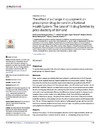Identificador persistente para citar o vincular este elemento:
https://accedacris.ulpgc.es/jspui/handle/10553/69247
| Título: | The effect of a change in co-payment on prescription drug demand in a National Health System: the case of 15 drug families by price elasticity of demand | Autores/as: | Hernández Izquierdo, Cristina González Lopez-Valcarcel, Beatriz Morris, Stephen Melnychuk, Mariya Abásolo Alesson, Ignacio |
Clasificación UNESCO: | 531207 Sanidad | Palabras clave: | Care utilization Free medicines Gasto farmaceútico España |
Fecha de publicación: | 2019 | Publicación seriada: | PLoS ONE | Resumen: | Objectives: To test the heterogeneity of the effect of a change in pharmaceutical cost-sharing by therapeutic groups in a Spanish region. Methods: Data: random sample (provided by the Canary Islands Health Service) of 40,471 people covered by the Spanish National Health System (SNHS) in the Canary Islands. The database includes individualised monthly-dispensed medications (prescribed by the SNHS) from one year before (August 2011) to one year after (June 2013) the Royal Decree Law 16/ 2012 (RDL 16/2012). Sample: two intervention groups (low-income pensioners and middleincome working population) and one control group (low-income working population). Empirical model: quasi-experimental difference-in-differences design to study the change in consumption (measured in number of monthly Defined Daily Dose (DDDs) per individual) among 13 therapeutic groups. The policy break indicator (three-level categorical variable) tested the existence of stockpiling between the reform’s announcement and its implementation. We ran 16 linear regression models (general, by therapeutic groups and by comorbidities) that considered whether the exclusion of some drugs from public provision impacted on consumption more than the co-payment increase. Results: General: Reduction (-13.04) in consumption after the reform’s implementation, which was fully compensated by a previous increase (16.60 i.e., stockpiling) among low-income pensioners. The middle-income working population maintained its trend of increasing consumption. Therapeutic groups: Reductions in consumption after the reform’s implementation among low-income pensioners in 7 of the 13 groups, which were fully compensated for by a previous increase (i.e., stockpiling) in 4 groups and partially compensated for in the remaining 3. The analysis without the excluded medicines provided fewer negative coefficients. Comorbidities: Reduction in consumption that was only slightly compensated for by a previous increase (i.e., stockpiling). Conclusions: The negative impact of cost-sharing produced, among low-income pensioners, a risk of loss of adherence to treatments, which could deteriorate the health status of individuals, especially among pensioners within the most inelastic therapeutic groups (associated with chronic diseases) and patients with comorbidities (also, associated with chronic diseases). Notwithstanding the above, this risk was more related to the exclusion of some drugs from provision than to the cost-sharing increase. | URI: | https://accedacris.ulpgc.es/handle/10553/69247 | ISSN: | 1932-6203 | DOI: | 10.1371/journal.pone.0213403 | Fuente: | Plos One[ISSN 1932-6203],v. 14 (3) |
| Colección: | Artículos |
Citas SCOPUSTM
13
actualizado el 08-jun-2025
Citas de WEB OF SCIENCETM
Citations
11
actualizado el 22-feb-2026
Visitas
62
actualizado el 10-ene-2026
Descargas
86
actualizado el 10-ene-2026
Google ScholarTM
Verifica
Altmetric
Comparte
Exporta metadatos
Los elementos en ULPGC accedaCRIS están protegidos por derechos de autor con todos los derechos reservados, a menos que se indique lo contrario.
